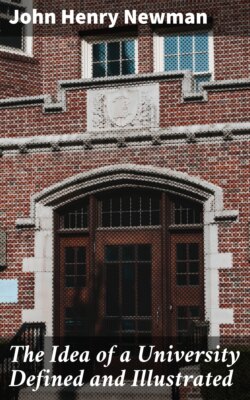Читать книгу The Idea of a University Defined and Illustrated - John Henry Newman - Страница 11
На сайте Литреса книга снята с продажи.
5.
ОглавлениеTable of Contents
This, I repeat, is what some good Catholics will say to me, and more than this. They will express themselves better than I can speak for them in their behalf,—with more earnestness and point, with more force of argument and fulness of detail; and I will frankly and at once acknowledge, that I shall insist on the high theological view of a University without attempting to give a direct answer to their arguments against its present practicability. I do not say an answer cannot be given; on the contrary, I have a confident expectation that, in proportion as those objections are looked in the face, they will fade away. But, however this may be, it would not become me to argue the matter with those who understand the circumstances of the problem so much better than myself. What do I know of the state of things in Ireland, that I should presume to put ideas of mine, which could not be right except by accident, by the side of theirs, who speak in the country of their birth and their home? No, Gentlemen, you are natural judges of the difficulties which beset us, and they are doubtless greater than I can even fancy or forbode. Let me, for the sake of argument, admit all you say against our enterprise, and a great deal more. Your proof of its intrinsic impossibility shall be to me as cogent as my own of its theological advisableness. Why, then, should I be so rash and perverse as to involve myself in trouble not properly mine? Why go out of my own place? [pg 013] Why so headstrong and reckless as to lay up for myself miscarriage and disappointment, as though I were not sure to have enough of personal trial anyhow without going about to seek for it?
Reflections such as these would be decisive even with the boldest and most capable minds, but for one consideration. In the midst of our difficulties I have one ground of hope, just one stay, but, as I think, a sufficient one, which serves me in the stead of all other argument whatever, which hardens me against criticism, which supports me if I begin to despond, and to which I ever come round, when the question of the possible and the expedient is brought into discussion. It is the decision of the Holy See; St. Peter has spoken, it is he who has enjoined that which seems to us so unpromising. He has spoken, and has a claim on us to trust him. He is no recluse, no solitary student, no dreamer about the past, no doter upon the dead and gone, no projector of the visionary. He for eighteen hundred years has lived in the world; he has seen all fortunes, he has encountered all adversaries, he has shaped himself for all emergencies. If ever there was a power on earth who had an eye for the times, who has confined himself to the practicable, and has been happy in his anticipations, whose words have been facts, and whose commands prophecies, such is he in the history of ages, who sits from generation to generation in the Chair of the Apostles, as the Vicar of Christ, and the Doctor of His Church.
